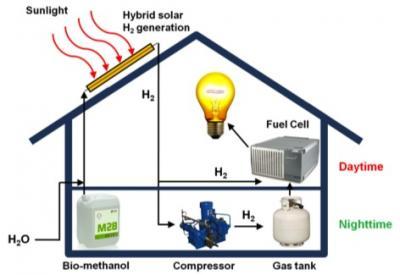Hybrid "solar" system for producing hydrogen for fuel cells

Fuel cells are becoming increasingly popular, and manufacturers have long been conducting experiments with fuel cells on hydrogen. Hydrogen is the most common element in the Universe, on Earth this gas is also not uncommon, it is quite easy to get it. The difficulty is in creating efficient fuel cells, but this problem can be solved. Experts from Duke University have proposed an interesting way to use solar panels to produce hydrogen, and not to directly generate electricity.
The system includes, in fact, panels that are combined with tubes with a mixture of methanol and water. All this is on the roof of the house, and heats up. When heated, a mixture of methanol and water passes through catalysts, where the reaction takes place with the formation of hydrogen. The obtained project authors propose to use hydrogen for fuel cells.
')
The advantage is that such a system is much less dependent on solar energy than a conventional system based on photovoltaic panels with direct electricity production. Hydrogen can be stored indefinitely, in addition, the filled fuel cell can be taken with you to any place, including an office, street or car. In addition, the system itself is more efficient and less overall than a system based on photovoltaic panels. And the efficiency of such a system is much higher than photocells. Thus, the efficiency of this system is 28.5% in the summer, and 18.5% in the winter. This is about 10-15% higher than in the case of photovoltaic cells.
Covering the panels allows up to 95% of the sunlight reaching the surface to be used. As a result, the temperature inside the tubes reaches 200 degrees above zero Celsius.
Cons, of course, the same is. The main disadvantage is the price. The minimum cost of such a system is $ 7,900. In addition, you also need a reliable system for converting hydrogen into electricity, of different power, of different performance. But there are already some changes here, and the authors of the project promise to present a completely ready system in a couple of years.
Via sciencedaily
Source: https://habr.com/ru/post/151424/
All Articles